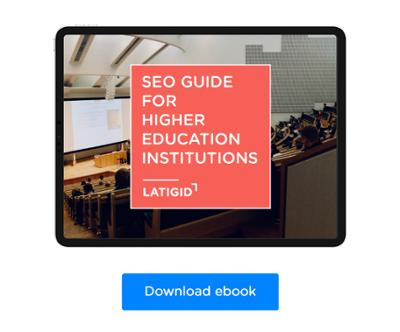
As competition intensifies, effective higher education lead generation strategies have become indispensable to succeed in this dynamic market.
By the end of this article, you'll gain invaluable insights into how to optimize your lead generation efforts, foster meaningful connections with potential students, and ultimately boost enrollment figures.
Definition of Lead Generation and its role in Higher Education
Lead generation is a crucial marketing process that involves identifying, attracting, and nurturing potential customers, in this case, students, who have shown interest in an educational institution's programs and offerings. This interest is typically demonstrated through various actions, such as filling out inquiry forms, attending webinars, signing up for newsletters, or engaging with the institution's content on social media.
It allows institutions to connect with potential students, understand their needs and preferences, and guide them on their journey from prospects to enrolled learners. By adopting innovative lead generation techniques and fostering personalized interactions, higher education institutions can achieve higher enrollment numbers and cultivate a thriving academic community.
The Role of Lead Generation in Higher Education:
Identifying and Attracting Prospective Students: Lead generation helps higher education institutions identify and reach out to potential students who are more likely to be interested in what the institution has to offer. By employing various marketing channels and strategies, such as social media marketing, search engine optimization (SEO), content marketing, and email campaigns, institutions can create targeted and personalized approaches to attract the right audience.
Building Relationships and Nurturing Prospects: Lead generation allows educational institutions to initiate meaningful interactions with prospective students. By capturing their contact information and preferences, institutions can engage in ongoing communication, providing relevant and valuable information about courses, campus life, scholarships, and other aspects that interest the students. Nurturing these relationships helps build trust and credibility, making it more likely for prospects to choose the institution.
Understanding Student Preferences and Behavior: Lead generation techniques provide valuable data and insights into the preferences and behavior of potential students. Institutions can analyze the data collected through lead generation efforts to better understand what drives student decision-making, what attracts them to a specific program, and which marketing strategies are most effective.
Improving Enrollment Conversion Rates: Effective lead generation tactics enable institutions to optimize their recruitment efforts and increase enrollment conversion rates. By tailoring communication and offerings based on the needs and interests of individual prospects, institutions can enhance their chances of converting leads into enrolled students.
Enhancing ROI and Resource Allocation: Lead generation helps institutions make informed decisions about where to allocate their marketing resources. By tracking the performance of different lead generation channels and campaigns, institutions can identify which methods are generating the best results and focus their efforts on those strategies.
Related article: How Lead Generation Drives Growth for Universities
Lead Generation tips tailored for Higher Education
Lead generation in higher education requires a tailored approach to attract and engage prospective students effectively. Here are some practical tips to optimize lead generation specifically for the higher education sector:
Create Compelling Content: Develop high-quality and informative content that showcases your institution's strengths, academic programs, campus life, and student success stories. Utilize blog posts, videos, virtual tours, and downloadable resources to engage potential students and provide valuable insights into the student experience.
Optimize Landing Pages: Design user-friendly landing pages that highlight specific programs or events and include clear calls-to-action (CTAs). Ensure the pages are mobile-friendly, fast-loading, and have concise forms for capturing lead information.
Leverage Social Media: Maintain an active and engaging social media presence to connect with prospective students. Share engaging content, host live Q&A sessions, and respond promptly to inquiries and comments.
Host Webinars and Virtual Events: Organize webinars and virtual events that showcase your institution's faculty, programs, and campus facilities. These interactive sessions allow potential students to ask questions and gain a better understanding of your offerings.
Use Email Marketing: Implement personalized and targeted email campaigns to nurture leads and keep them informed about application deadlines, scholarship opportunities, and campus events.
Offer Scholarships and Financial Incentives: Create scholarship programs and offer financial incentives to attract top talent. Highlight these opportunities in your lead generation campaigns to entice prospective students.
Engage with Alumni and Current Students: Encourage alumni and current students to participate in recruitment efforts. Alumni can share their success stories, while current students can provide authentic insights into campus life and academic experiences.
Conduct Web Analytics: Use web analytics tools to track user behavior on your website and landing pages. Analyze the data to identify popular content, assess lead conversion rates, and make data-driven improvements.
Implement SEO Strategies: Optimize your website and content with relevant keywords to improve search engine rankings. This will increase organic traffic and enhance the visibility of your institution to potential students.
Personalize Communication: Tailor your communication with prospective students based on their interests and preferences. Use the data collected during the lead generation process to send personalized emails and relevant information.
Participate in Education Fairs and Events: Engage in both virtual and physical education fairs and events to connect directly with potential students and answer their questions about your institution.
Highlight Accreditation and Rankings: Emphasize your institution's accreditation and rankings to build trust and credibility. Showcase awards and recognition received by the institution to boost its reputation.
Collaborate with High Schools and Educational Agencies: Partner with high schools, educational agencies, and counselors to widen your reach and build relationships with prospective students and their influencers.
Related article: 7 Lead Generation Mistakes Universities Make
About LATIGID
We are a Higher Education Marketing Agency, specializing in Inbound Marketing. We help you grow by increasing website traffic, generating more student leads, and closing those leads into enrollment. With a deep understanding of the latest industry trends and best practices, we are well equipped to help your institution grow.
If you are looking for a Higher Education Marketing Agency to partner with, check our page to see what we can do for you!
Download our SEO guide and learn how to build a strategy to optimize your Higher Education Institution's website





